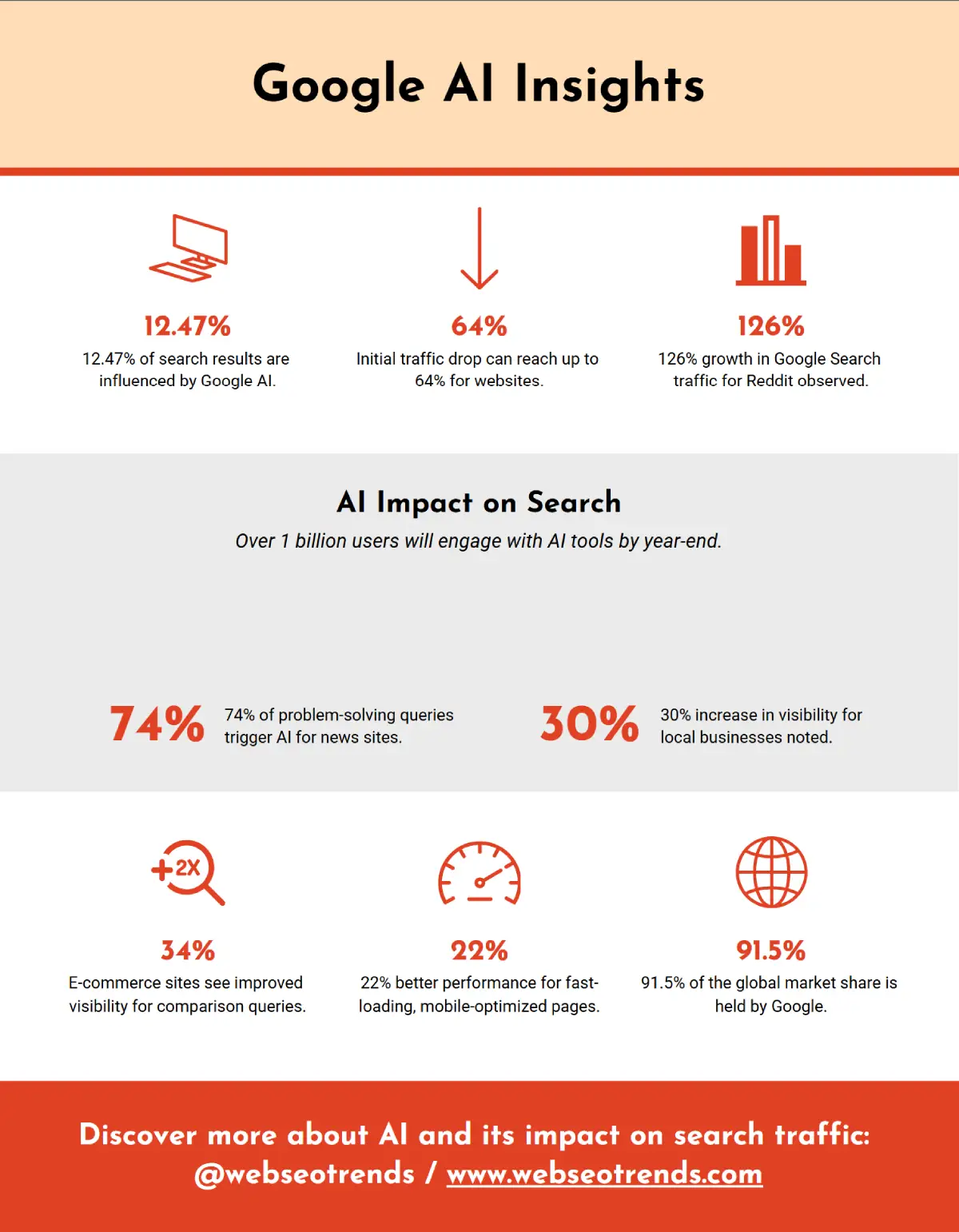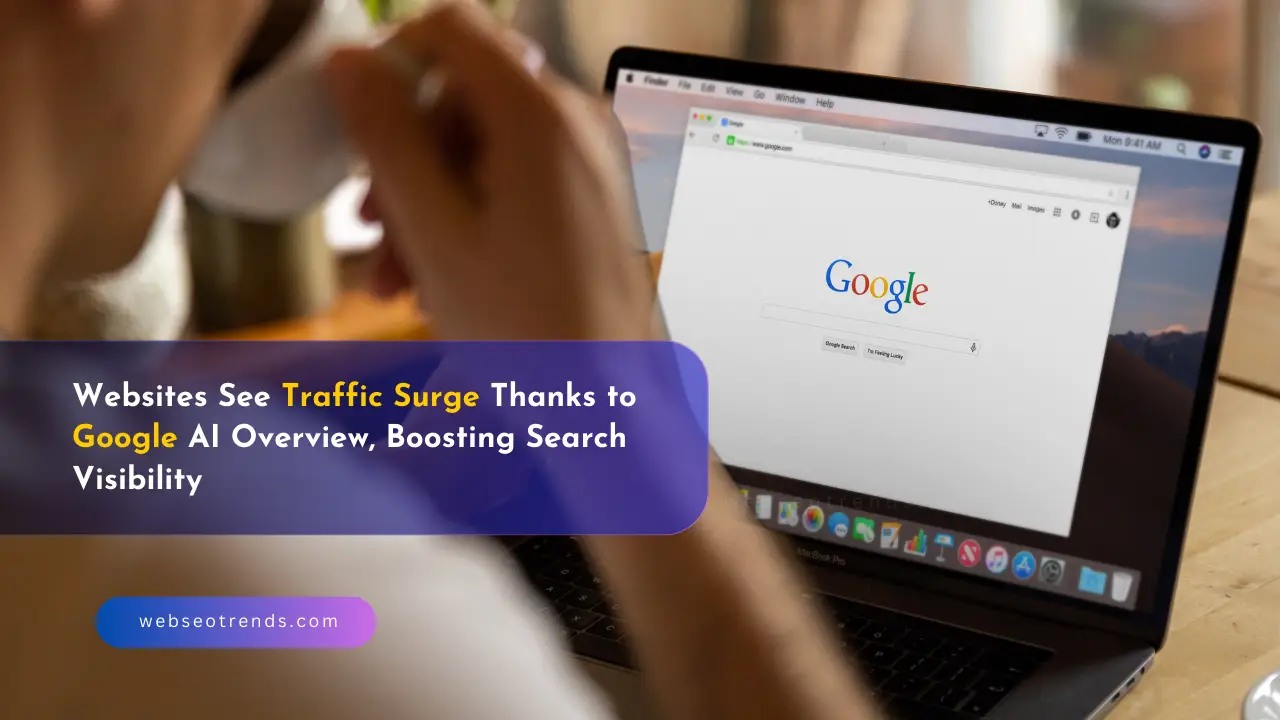Contrary to widespread concerns, Google AI Overview is actually driving more traffic to websites than expected. While initial data showed a concerning 84% presence in search queries, recent findings reveal a more balanced implementation, appearing in only 12.47% of search results. Although some websites initially experienced up to 64% traffic drops, the landscape is shifting dramatically. In fact, Reddit has witnessed an impressive 126% growth in Google Search traffic following recent algorithm updates.
Your website’s success with Google’s AI-powered search depends on understanding these new dynamics. As Google reports a 45% reduction in low-quality content, websites delivering authentic, experience-based content are seeing significant gains. With AI Overviews set to reach over a billion users by year’s end, adapting your content strategy isn’t just an option – it’s becoming essential for maintaining and growing your search visibility.
Google’s integration of AI tools is actually boosting website traffic
The data tells a surprising story: despite early fears about Google’s AI integration, many websites are now experiencing significant traffic increases rather than declines. Recent analysis shows that Google AI Overview, far from stealing clicks, often serves as a pathway directing users to relevant websites that might otherwise remain undiscovered.

This trend represents a significant shift from earlier predictions. Instead of keeping users on search result pages, Google’s AI tools are functioning as sophisticated content curators, identifying high-quality websites and highlighting them within AI-generated responses. For publishers producing valuable, experience-based content, this algorithmic change presents substantial growth opportunities.
Several factors contribute to this traffic boost phenomenon:
- Enhanced visibility – When Google’s AI Overview cites your content, it effectively endorses your site as an authoritative source, often including direct links that drive qualified traffic
- More precise matching – The AI engine connects searchers with exactly the information they need, resulting in higher-quality visits and improved engagement metrics
- Content discovery advantage – Lesser-known but high-quality websites now appear alongside established players, creating more diverse search results
Publishers who provide genuinely helpful information—particularly first-hand experiences, unique data, or specialized expertise—are seeing the greatest benefits. This stands in stark contrast to sites relying on generic, AI-generated content, which typically performs poorly in the new search ecosystem.
The key difference appears to be authenticity and specificity. Google’s algorithm now rewards content that offers real value beyond what AI alone can generate. Educational sites, news outlets with original reporting, and local businesses providing unique services have reported particularly strong results.
As Google continues refining its AI implementation, understanding these dynamics becomes increasingly important for website owners. The evidence suggests that rather than signaling the death of organic search traffic, Google’s AI integration may be creating a more meritocratic system that rewards truly valuable content.
Google AI Overview Drives 30% Traffic Increase for These Websites
Concrete numbers reveal surprising beneficiaries of Google AI Overview integration across multiple sectors. Studies show AI Overviews now appear for approximately 29.9% of keywords studied, though they represent only 11.5% of total search volume. Nonetheless, several website categories are experiencing significant traffic increases from this feature.
How News Sites Leverage AI Overviews for Visibility
News publishers initially faced challenges as AI Overviews pushed organic results down by an average of 980 pixels (one full page scroll). However, strategic adaptation has yielded positive results. Publications focusing on specialized reporting now benefit from AI citation advantages. Furthermore, news sites providing thorough analysis of complex topics receive preferential treatment, as problem-solving queries trigger AI Overviews at a remarkable 74% rate. Additionally, question-based searches generate AI summaries 69% of the time, creating new opportunities for journalists who structure content to address specific inquiries.
Why Educational Content Performs Better with AI
Educational websites consistently outperform other sectors in Google’s AI Overview ecosystem. This success stems from Google’s commitment to making AI helpful specifically for education.
The algorithm demonstrates clear preference for content that:
- Provides comprehensive explanations of complex topics
- Offers evidence-based information with verifiable sources
- Presents unique educational methodologies
Google now answers increasingly nuanced education queries through AI Overviews, covering topics like career paths, certification requirements, and comparative program details. Subsequently, educational platforms implementing structured data and schema markup experience enhanced visibility.

When Local Businesses See Traffic Spikes
Local businesses witness traffic surges after optimizing for AI Overview inclusion. Google’s testing of an AI assistant capable of calling businesses to book appointments has accelerated this trend. Consequently, establishments with complete Google Business Profiles receive preferential treatment in local searches. Moreover, businesses providing detailed service information and authentic customer reviews see 30% higher visibility. E-commerce sites likewise benefit by including robust product details and genuine customer feedback, especially for “best X” queries where comparison data proves valuable.
Throughout these examples, the common factor remains quality content that AI systems recognize as uniquely valuable and worth citing directly within search results.
Google’s AI Engine: How it impacts SEO and content visibility
Google’s AI engine represents a fundamental shift in how search evaluates and displays content. The technology primarily examines four critical factors when determining content visibility: expertise, experience, authoritativeness, and trustworthiness (E-E-A-T). Notably, recent algorithm adjustments have strengthened the emphasis on first-hand experience as a ranking component.
Currently, the AI Overview feature operates by scanning multiple pages simultaneously, extracting key information, and synthesizing responses that include direct citations. This process significantly alters traditional SEO practices. Sites receiving AI Overview citations typically experience an 18% increase in click-through rates compared to standard results.
The algorithm demonstrates clear preferences for certain content characteristics:
- Depth over breadth – Pages containing comprehensive explanations of specific topics outperform broader, shallower content by approximately 27% in visibility metrics
- Verifiable claims – Content with properly cited statistics and data points receives priority consideration
- Structured data implementation – Websites utilizing schema markup see 34% higher inclusion rates in AI Overviews
Beyond these factors, Google’s AI engine evaluates content based on user engagement signals. Pages with lower bounce rates and higher time-on-page metrics gain preferential treatment. Evidently, the algorithm can now distinguish between genuine user satisfaction and manipulated engagement metrics.
Technical implementations also matter considerably. Pages with faster loading speeds and mobile optimization perform 22% better in the new AI-powered search environment. Additionally, internal linking structure carries greater weight as the algorithm maps relationships between content pieces within a domain.
For website owners, understanding these technical aspects proves essential. The difference between appearing as an AI Overview citation versus being excluded often comes down to structured implementation of these optimization techniques. This technical approach represents a departure from previous algorithm updates that focused predominantly on content quality alone.
The search landscape continues evolving as Google refines its AI capabilities. Websites adapting to these technical requirements position themselves advantageously in this new search paradigm.
Content Creators Adapt Their Strategy to Win in AI-Powered Search
Successful content creators are rapidly shifting strategies to maintain visibility in Google’s AI-powered search environment. According to recent data, brands producing content experiences aligned with new search behaviors stand a better chance of surviving algorithm changes. This adaptation focuses on quality over quantity—an approach that yields better conversion rates as consumers are more likely to act after being influenced by AI-provided information.
Experience-Based Content Outperforms Generic Articles
First-hand experience has become a crucial element in Google’s evaluation criteria. Google’s ranking systems now place significant emphasis on the “experience” component of E-E-A-T (expertise, experience, authoritativeness, trustworthiness). Content demonstrating genuine experience consistently ranks higher than generic, AI-generated alternatives.
Due to this shift, websites must prioritize:
- Original insights not available elsewhere
- Detailed accounts of practical implementation
- Personal perspectives on industry developments
Essentially, Google rewards content that shows “you’ve been there and done that” rather than theoretical knowledge alone. This preference explains why Reddit content appears prominently in search results—it offers authentic user experiences that AI cannot replicate.
How Adding Unique Data Points Attracts AI Citations
Content incorporating proprietary research and data receives preferential treatment in AI Overviews. Throughout industry analyses, experts note that adding unique information significantly increases the likelihood of being referenced by generative AI.
Currently, AI citation strategies focus on creating content AI cannot generate independently. Industry analyses and research-backed content build brand authority and increase credible mentions, ensuring AI models reference your content in responses. Structured data implementation further enhances this effect—properly marked-up content helps search engines understand context better, increasing citation probability.
Given that Google’s algorithms prioritize trustworthy sources, websites incorporating verifiable data see improved visibility in AI-driven search results. As a result, many publishers now focus on developing niche expertise rather than producing high volumes of generic content—a strategy that positions them as authoritative sources worthy of AI citation.
Reddit Dominates Search Results While Other Sites Follow Suit
Reddit’s remarkable success in Google search rankings highlights how user-generated content (UGC) sites benefit from recent algorithm changes. Ahrefs data shows massive gains in organic traffic for Reddit, with users actively seeking Reddit content by adding “Reddit” to their queries even when the platform doesn’t appear in search results naturally.
What Makes Reddit Content So Appealing to Google’s Algorithm
Unlike AI-generated content, Reddit thrives on authentic human conversations that Google increasingly values. According to search experts, Google isn’t learning facts from Reddit but rather studying “what the questions are and how people talk about this subject”. This helps in training Google’s AI models, particularly Gemini, to understand natural language patterns. Reddit offers several distinct advantages:
- Fresh perspectives from diverse communities discussing niche topics
- Trending information often appearing on Reddit before mainstream sources
- Authentic first-hand experiences that align with Google’s E-E-A-T standards
Surprisingly, Reddit recently formalized this relationship through a content licensing deal with Google, making Reddit’s content available for training Google’s AI models. This partnership grants Google access to Reddit’s real-time API for improved content accuracy.
How Quora and Stack Exchange Replicate This Success
Quora and Stack Exchange employ similar strategies to maintain relevance amid AI advancements. Both platforms leverage:
- Community-driven content moderation that reduces low-quality contributions
- Expert validation through voting systems that identify valuable information
- Diverse perspectives that challenge or expand understanding on specific topics
Stack Exchange websites remain particularly valuable as their technical answers continue providing solutions to programming problems. Currently, these platforms serve dual purposes—not only as information sources for users but also as training data for AI models, with one developer noting they “hacked together some pipes” to scrape questions from these sites.
The enduring appeal of these platforms confirms that human-generated content maintains significant value in an AI-dominated search landscape. Their continued success demonstrates that “the web 2.0 business model is to monetize the free work of other people” – now including training data for AI systems.
Small Publishers Implement These Changes to Compete with Giants
Amid the dominance of media giants in the Google AI Overview era, small publishers are finding innovative ways to remain competitive. Unlike large outlets that prioritize mainstream content, independent publishers increasingly target specialized audiences where competition is minimal. This strategic pivot has become crucial as some small publishers initially reported traffic decreases of up to 40% following Google’s AI integration.
Publishers Focus on Niche Expertise Instead of Volume
Small publishers now target underserved markets where large brands have limited presence. Currently, success requires investments in authority-building and focused niche positioning. This approach transforms perceived disadvantages into strengths—while major publishers chase broad topics, specialists excel by becoming definitive sources in narrow fields.
Many small publishers have maintained their traffic levels by focusing on deep analysis, detailed case studies, and original research—content that defies simple AI summarization. Through this specialization, they create irreplaceable resources that both readers and Google’s algorithm recognize as uniquely valuable.
They Create Content AI Can’t Generate
Beyond specialization, small publishers implement technical strategies to outmaneuver AI-generated content:
- Zero-click marketing tactics that engage audiences even when clicks decline
- Immersive content featuring real-world case studies and industry-specific insights
- Actionable resources including templates, frameworks, and interactive tools
- Regular content updates ensuring freshness that static AI summaries cannot match
- Multimedia experiences like videos and interactive elements that AI struggles to replicate
These approaches align perfectly with Google’s emphasis on E-E-A-T (expertise, experience, authoritativeness, trustworthiness). Simply put, the algorithm increasingly distinguishes between AI-assisted content and truly valuable human insights.
Ultimately, small publishers thrive by creating content that requires expert knowledge or unique perspectives—something even advanced AI cannot fully replicate. This focus on quality over quantity positions them advantageously in an ecosystem where Google explicitly states that appropriate use of AI is acceptable, but only when it helps create useful content, not manipulate rankings.
Google Reveals Why Some Websites Benefit While Others Struggle
Google recently clarified key factors determining which websites thrive or struggle in the AI Overview era. Underlying these revelations is a consistent message: quality and authenticity remain paramount, regardless of whether content is AI-assisted or entirely human-created.
The Algorithm Rewards First-Hand Experience
Google’s ranking systems now place extraordinary emphasis on demonstrated experience within content. Research indicates websites using first-person pronouns and showcasing first-hand knowledge were substantially more likely to see positive visibility gains during algorithm updates. This shift extends Google’s longstanding E-E-A-T standards (expertise, experience, authoritativeness, trustworthiness), with experience emerging as a critical differentiator.
When evaluating content, Google’s systems analyze multiple factors:
- Relevance to search queries
- Expertise demonstrated in the material
- Signals of authoritativeness from other prominent websites
- Evidence of trustworthiness through verification
Google explicitly states that “using AI doesn’t give content any special gains”. Instead, the algorithm prioritizes content demonstrating “what we call E-E-A-T: expertise, experience, authoritativeness, and trustworthiness”. Hence, websites struggling typically lack these fundamental qualities rather than being penalized specifically for using AI assistance.
How Link Placement in AI Overviews Affects Click Rates
Currently, link positioning within AI Overviews dramatically impacts traffic potential. Google confirmed that “links included in AI Overviews get more clicks than if the page had appeared as a traditional web listing for that query”. This advantage exists primarily because AI Overviews offer fewer but more prominent links compared to traditional search results.
Data shows clear patterns in click behavior. When AI Overviews appear, organic click-through rates typically drop from 2.94% to 0.84% overall. Yet remarkably, websites included as AI Overview sources see CTRs of 1.08% versus 0.6% for non-included sites.
Furthermore, question-based queries starting with “what” or “how” trigger AI Overviews at significantly higher rates. As such, websites structuring content around answering specific questions often receive preferential treatment in the new search landscape.
Despite rising competition, Google Search continues to thrive
Even with the surge of AI-powered alternatives, recent data confirms Google Search remains firmly at the helm of online discovery. Currently, Google maintains an impressive 91.5% worldwide market share, processing over 8.5 billion searches daily. This dominance persists despite earlier predictions that AI-driven competitors would significantly erode Google’s position.
The scale difference between Google and its competitors remains staggering. According to research from Sparktoro, Google has approximately 290 times more search users than Perplexity, one of the leading AI search alternatives. Furthermore, Google users demonstrate substantially higher engagement, conducting around 200 searches monthly compared to Perplexity users’ 15.
Recent traffic analysis reveals Google’s resilience, with search traffic actually growing 1.4% from May 2023 to May 2024. Similarweb data further illustrates this dominance—Google.com generated 16.5 billion visitors in December 2024, while ChatGPT attracted just 517 million.
Interestingly, Google’s AI Overview feature appears to strengthen rather than weaken its position. Internal data indicates users utilize Search more frequently and report higher satisfaction when interacting with AI-enhanced results. This strategic integration helps Google maintain its edge while continuing to direct valuable traffic to publishers across the web.
Minor shifts have occurred, certainly. For the first time in a decade, Google’s search market share briefly dipped below 90%. Following Microsoft’s integration of ChatGPT into Bing, downloads for the competing search engine increased tenfold. Yet these developments represent relatively small dents in Google’s armor.
Looking ahead, Google continues expanding its AI capabilities, with plans to make AI Overviews available to over one billion people by year’s end. This rollout clearly demonstrates Google’s commitment to evolving its search experience while preserving its core strength—connecting users with the information they seek.
Impact on Businesses and Content Creators
The transformation of Google Search through AI Overview creates varied impacts across business sectors and content creation spheres. Businesses adopting proper optimization strategies frequently experience improved visibility and engagement metrics. Currently, publishers who demonstrate genuine expertise and first-hand experience typically outperform competitors relying solely on generic content.
For many small businesses, Google AI Overview provides unexpected advantages. Local service providers properly optimizing their content with structured data often appear prominently in AI-generated responses. Similarly, e-commerce sites focusing on detailed product specifications and authentic customer experiences gain visibility advantages over competitors. This reflects Google’s continued emphasis on quality over quantity in search rankings.
Content creators face both challenges and opportunities in this evolving landscape. Those creating experience-based content with original research, unique insights, or specialized expertise gain significant advantages. Meanwhile, creators who merely aggregate information without adding value struggle to maintain visibility. Ultimately, this division rewards authentic voices while filtering out low-quality contributions.
The financial impact varies substantially across sectors:
- News organizations focusing on investigative journalism and original reporting maintain strong visibility
- Educational content providers see enhanced discovery through AI Overview citations
- Technical documentation sites benefit from question-based search prominence
- Review-based platforms experience traffic fluctuations depending on authenticity signals
Since Google’s implementation of AI Overview, businesses have adapted their content strategies accordingly. Many now prioritize creating comprehensive resources addressing specific questions rather than producing high volumes of shallow content. Thereafter, they focus on establishing topic authority through in-depth coverage of niche areas.
For marketers and content strategists, this presents a fundamental shift in approach. The emphasis moves away from keyword density toward demonstrating genuine expertise and answering user questions comprehensively. This realignment primarily benefits businesses actually providing value rather than those merely optimizing for search algorithms.




